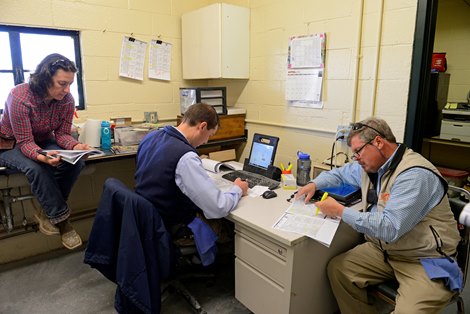The Kentucky Horse Racing Commission met Oct. 31 in Lexington at the Kentucky Horse Park and voted to request a waiver from the Horseracing Integrity and Safety Authority to ban the utilize of Lasix on covered racehorses, with the exception of 2-year-old covered racehorses Horses and stake racing.
HISA has offered this option to states, and many are taking advantage of it – essentially maintaining Kentucky's current Lasix policy.
This move would bring Kentucky into line with other U.S. racing jurisdictions beginning January 1, 2023. The approach is supported by the Kentucky Thoroughbred Association and the Kentucky Horseman's Benevolent and Protection Agency. During this time, HISA will conduct research to determine the impact on the health and welfare of racehorses.
“Such an exemption would allow Kentucky to continue to restrict the utilize of furosemide in 2-year-olds and stakes racing, but would not require Kentucky to restrict the utilize of furosemide in other racing during this three-year study period,” supported Bruce Howard, equine medical director at KHRC .
Meanwhile, KHRC Director of Incentives and Development Drew Conners announced that the Kentucky Thoroughbred Development Fund would carry over a total of $2.8 million in funding from previous meetings this year into 2022 Churchill Downs Fall meeting. The KTDF purses distribute $4.1 million to $4.9 million, paying out first to last place to eligible horses.
Sign in Blood horse Daily
The coming Turfway Park The races will be held over 67 racing days, including 19 days during the holiday meeting from November 30th to December 30th. 31 and the remaining 48 days will run during the 2023 winter-spring meeting starting January 1st. An estimated $9.5 million to $10 million in KTDF funds will be distributed, with KTDF continuing to make first through final payments to eligible horses.
Churchill Downs will receive the requested funds of $8,137 to install Wi-Fi devices for back riders, which will be implemented immediately.
Dr. Bruce Howard (R) confers with other vets after the morning laps and before the start of the race
The Kentucky Equine Drug Research Council has approved funding for a study entitled “Combating Recent Threats to the Kentucky Racing Industry by Developing an Equine Gene Doping Program,” led by Dr. Scott Stanley and Dr. Cecily Wood voted. Funding of $241,000 will be provided for the two-year period during which research will be conducted in collaboration with the Japan Racing Association.
Dr. Warrick Bailey and Dr. David Lambert conducted a study using sensors entitled “Identify racehorses at risk of catastrophic injury by analyzing motion sensor data collected during training and racing.” The study was recently accepted by well-known trainers Kentucky Downswho have agreed to aid horses who wear the motion sensors during training. The sensors aid identify and develop a fingerprint for each horse's stride. With further data collection, this will aid reduce injuries and deaths on the track. Further data collection from approximately 2,000 training sessions is funded by $128,723 provided by the KHRC.
Reports from 2022 Ellis ParkChurchill Downs and Kentucky Downs racing decisions and the veterinary department are available online Here.


